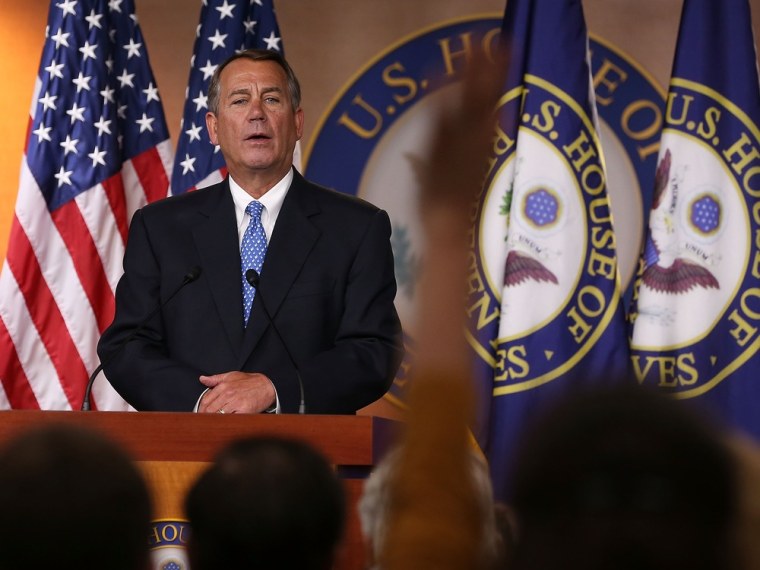House Speaker John Boehner expressed support for a short-term measure to avoid a government shutdown one day after GOP leaders canceled a vote on a major spending bill due to internal Republican discord.
The top House Republican said passage of a stopgap measure -- known as a "continuing resolution," or CR -- could avoid a shutdown at the end of the government's fiscal year, which concludes at the end of September.

"I believe a continuing resolution for some short period of time would probably be in the nation's interest," Boehner said at his weekly press conference. "But having said that, the idea of operating for an entire year under a CR is not a good way to do business."
That legislation, though, is expected to be fraught with the kind of politics that played out on Wednesday, when Republican leaders hastily canceled a vote on a major transportation and housing bill after it became clear that the legislation lacked the votes for passage.
The legislation (known on Capitol Hill by the acronym "THUD") had called for cuts to transportation and housing and urban development budgets even beyond the automatic spending cuts enacted in this year's "sequester." The legislation nonetheless fractured Republicans who control the majority in the House; some moderates viewed the cuts as too destructive, and a bloc of conservatives had been expected to oppose the legislation as well. Combined with Democrats' virtually unanimous opposition to the austere THUD package, its prospects were doomed.
(For his part, Boehner argued that pulling the THUD legislation was only a matter of timing. "I believe that the votes would have been there for the THUD bill," he said.)
The fiasco won a rare rebuke from the veteran Republican lawmaker, Kentucky Rep. Hal Rogers, in charge of writing spending bills.
"With this action, the House has declined to proceed on the implementation of the very budget it adopted just three months ago," Rogers said in a statement Wednesday evening. "Thus, I believe that the House has made its choice: sequestration – and its unrealistic and ill-conceived discretionary cuts – must be brought to an end."
The blowup resembled several other legislative breakdowns for House Republicans this year, most recently when a major piece of farm legislation went down in flames due to conservative opposition and Democrats' anger at cuts to food stamp programs. (Only after the food stamp provisions were separated from the farm bill did the House pass it -- by a narrow margin.)
Those legislative meltdowns set the stage for a politically tricky battle this fall over avoiding a government shutdown and defaulting on the national debt. Boehner essentially said Thursday that he didn't think there would be enough time for lawmakers to finish spending bills for the next fiscal year following its August recess, which begins next week. For that reason, he called for the continuing resolution -- a short-term measure that would keep the government open. Similar legislation has been routine in the past, but itnernal Republican politics could come back into play during that fight.
Conservatives, for instance, have insisted that any measure to continue funding the government be linked to legislation that would also completely defund President Barack Obama's signature health care reform law. Though that prospect is a nonstarter with the Democratic Senate and the White House, GOP leaders are under immense pressure from the party's grassroots to provoke another showdown over "Obamacare."
On Thursday, Boehner kept coy about whether he would adopt such a strategy.
"No decisions have been made on how we're going to proceed with the CR," he said.
But Boehner faces the very real prospect of Democrats again forcing Boehner to pass such a CR with Republican votes alone, forcing the speaker to corral conservatives who might threaten to jilt their leader if the continuing resolution doesn't touch on Obamacare.